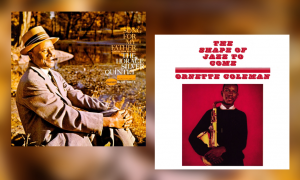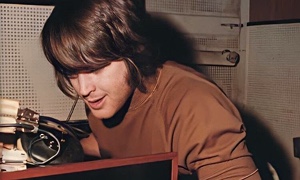Home » Jazz Articles » Building a Jazz Library » Impulse! Records: An Alternative Top 20 Zeitgeist Seizing Albums
Impulse! Records: An Alternative Top 20 Zeitgeist Seizing Albums

The music of a well-ordered age is calm and cheerful, and so is its government. The music of a restive age is excited and fierce, and its government is perverted.
—Lu Buwei
Impulse! entered this arena in 1961. For its first year the label was under the direction of Creed Taylor, a suave and softly spoken producer who nonetheless was responsible for John Coltrane's smoking-hot label debut Africa / Brass (1961). After Taylor left to head up Verve, Impulse! was in the hands Bob Thiele until mid 1969. Thiele shared Taylor's passion for jazz, but otherwise the two could hardly have been more different.
Sid Feller, a producer / arranger at ABC-Paramount, the corporate which owned Impulse!, described Thiele as "a New York street guy, a Broadway cowboy." Thiele was a hustler who wanted to produce hits. But more than anything he wanted to make great jazz, and his instinct was sharp enough to detect the direction in which the music was moving. He allowed Coltrane studio time whenever he asked for it, enabling him to record a large and magnificent body of work, some of which, even in 2020, has still to be released.
Thiele also signed similarly cutting-edge musicians recommended to him by Coltrane, such as Archie Shepp, Pharoah Sanders, Albert Ayler and Marion Brown. Together these musicians constituted the vanguard of what was known at the time as the New Thing. It was a fierce, confrontational strand of predominantly African American jazz that was hardwired into the counterculture in general and the black liberation movement in particular. In the 1960s, Impulse! was the New Thing's primary platform.
To begin with, Thiele did all this in the face of sustained opposition from the jazz establishment. A typical response to the new music was given by the critic Ira Gitler in Downbeat in 1962. Reviewing Max Roach's Impulse! album Percussion Bitter Sweet, Gitler accused the singer Abbey Lincoln, who is featured on two tracks, of being a "professional Negro." Such was the incomprehension and hostility with which the majority of the predominanty white critical establishment greeted the revolution going on in African American jazz.
History repeats itself, and in 2020 Impulse! is once more foregrounding the oppositional voice of jazz. Most significantly, in 2018 the label signed British reeds player Shabaka Hutchings. It has since released four albums by three of Hutchings' bands—Sons of Kemet, Shabaka & the Ancestors and The Comet Is Coming (pictured above). Hutchings represents a socially informed style of jazz which confronts racism, poverty and political authoritarianism much like the New Thing did in the 1960s. On the threshold of its 60th anniversary in 2021, Impulse! has made a great start in regaining its foundational relevance.
It is important to remember that not all Impulse! releases of the 1960s were politically fired up. A secondary strand was mainstream jazz. And some of the New Thing players closely associated with its most turbulent work—such as Sanders, Alice Coltrane and John Coltrane—also made albums of seraphic, mellifluous music. The New Thing had both yin and yang.
In order to make room for other titles, the top twenty which follows deliberately excludes Impulse's most essential and widely celebrated releases—chief among them John Coltrane's A Love Supreme (1965) and all other Coltrane albums released by the label during his lifetime. Also excluded are such familiar discs as Ray Charles' Genius + Soul = Jazz (1961), Gil Evans' Out Of The Cool (1961), Oliver Nelson's The Blues And The Abstract Truth (1961), Benny Carter's Further Definitions (1962), Charles Mingus' The Black Saint And The Sinner Lady (1963), Archie Shepp's Four For Trane (1965), Sonny Rollins' On Impulse! (1965), Pharoah Sanders' Karma (1969) and Alice Coltrane's Journey In Satchidananda (1971).
This leaves a raft of landmark albums which are in 2020 less well known and, in a few cases, barely remembered at all. Hopefully you will find among them some items that have so far escaped your attention.
IMPULSE! RECORDS: 20 ALTERNATIVE EXCLAMATION MARKS
 Art Blakey
Art Blakey Impulse!!!!! Art Blakey!!!!! Jazz Messengers!!!!!
1961
Hard bop is not a genre usually associated with Impulse!, and most of Art Blakey's work from the mid 1950s through the mid 1960s was recorded for Blue Note. But Jazz Messengers!!!!! is among Blakey's finest albums of the era and was made with one of his most exciting lineups. He leads a sextet comprising trumpeter Lee Morgan, trombonist Curtis Fuller, tenor saxophonist Wayne Shorter, pianist Bobby Timmons and bassist Jymie Merritt. A few months later, with Freddie Hubbard replacing Morgan and Cedar Walton replacing Timmons, the sextet recorded the better known Mosaic (Blue Note, 1961).
 Curtis Fuller
Curtis Fuller Soul Trombone And The Jazz Clan
1962
Curtis Fuller's funk-driven Impulse! debut followed a similar path as Blakey's album and was made with a similarly constructed sextet—tenor saxophonist Jimmy Heath, Freddie Hubbard, Cedar Walton, Jymie Merritt and drummers Jimmy Cobb (five tracks) and G.T. Logan (one track). Fuller's "Alamode" was track one, side one of the Blakey disc, and three of his originals are featured here. One of them, "Newdles," was named in gratitude to ABC's director of sales, Larry Newton. "They signed me for a big contract in those days, ten thousand dollars," Fuller said in 2006. "That was money, you know. I went to New Jersey and put a down payment on a home." The three standards include a lovely Jimmy Heath arrangement of Bob Hilliard and David Mann's "In The Wee Small Hours Of The Morning."
 Gloria Coleman
Gloria Coleman Soul Sisters
1964
Jazz was still overwhelmingly the domain of male musicians in the 1960s and, aside from the prolific pianist and harpist Alice Coltrane and equally prolific organist Shirley Scott, Impulse!'s catalogue reflected that. Fellow organist Gloria Coleman made just one album for the label. Soul Sisters features drummer Pola Roberts and the rear sleeve breathlessly (and inaccurately) informs readers that Coleman and Roberts are "two girls unique in their understanding of today's jazz." More accurately, it describes the music as "'funky' and soulful, swingin' and [with a] meaningful message." Coleman's quartet also includes guitarist Grant Green and alto saxophonist Leo Wright. All but one of the six tracks, Green's "Funky Bob," are Coleman originals. One of them, "Melba's Minor," is dedicated to the pioneering woman trombonist / arranger Melba Liston. Coleman, by the way, was married to tenor saxophonist George Coleman.
 Chico Hamilton
Chico Hamilton Man From Two Worlds
1964
Like his fellow drummer Art Blakey, Chico Hamilton had a talent for recruiting talented young musicians. He was the first bandleader to record with reed player Eric Dolphy, on The Original Ellington Suite (Pacific Jazz), made in 1958 but not released until 2000. In 1966, he was the first to record with guitarist Larry Coryell, on The Dealer (Impulse!). And in 1961, he was the first to record with reed player Charles Lloyd, on Bye Bye Birdie / Irma La Douce (Columbia). Man From Two Worlds included the debut recording of Lloyd's "Forest Flower," the piece which would make him a US star at the 1966 Monterey Jazz Festival and an international star with Forest Flower: Charles Lloyd At Monterey (Atlantic) a year later. The other two members of Hamilton's quartet are guitarist Gabor Szabo, soon to become a bankable Impulse! asset himself, and bassist Albert Stinson.
 Johnny Hodges
Johnny Hodges Everybody Knows Johnny Hodges
1964
Bob Thiele's taste in jazz was strictly mainstream before the Impulse! baptism of fire which was John Coltrane's Live At The Village Vanguard (1962), which he produced only a week or so after joining the label. He continued to record mainstream albums for Impulse!, although, with the exception of Benny Carter's aforementioned masterpiece Further Definitions, these have been overshadowed by the label's New Thing releases. Johnny Hodges' Everybody Knows, made with the core of the Duke Ellington band, is one such neglected gem. Others include Ben Webster's See You At The Fair and Clark Terry's The Happy Horns Of Clark Terry, both also released in 1964.
 Johnny Hartman
Johnny Hartman I Just Dropped By To Say Hello
1964
Nothing in singer Johnny Hartman's three-decade recording career tops his 1963 Impulse! debut, John Coltrane And Johnny Hartman, made with Coltrane's classic quartet. But I Just Dropped By To Say Hello gets pretty close. This time out Hartman's tenor saxophone foil is Illinois Jacquet. The drummer once again is Elvin Jones. Hartman himself is in great form on a set of eleven standards (twice as many as on the Coltrane album, where longer tracks gave equal time to Coltrane's solos). Jim Hall and Kenny Burrell alternate on guitar, Hank Jones is on piano and Milt Hinton is on bass. It must have taken some nerve for a singer to revisit the Frank Sinatra hit "In The Wee Small Hours Of The Morning," but Hartman pulls it off.
 Shirley Scott
Shirley Scott Queen Of The Organ
1965
Soul-jazz organist Shirley Scott released nine albums on Impulse! between 1963 and 1966. Recorded live, Queen Of The Organ is arguably the best. It was made in The Front Room, a neighbourhood bar in Newark, New Jersey. Scott's tenor saxophonist (and husband), Stanley Turrentine, later said the venue was "typical of the chitlins circuit we mainly played at, with bad sound systems and small audiences, where we'd go in and we'd blow our hearts out." The album, however, has a real sense of occasion and sounds terrific. It was recorded by Rudy Van Gelder, the go-to engineer for Impulse! as well as Blue Note and Prestige.
 John Coltrane
John Coltrane Sun Ship
1971 (recorded 1965)
Forget Both Directions At Once: The Lost Album, first released in 2018. Sun Ship, a superior affair, is the real lost John Coltrane album. It was recorded by the classic quartet in summer 1965, between the large line-up sessions for
 Yusef Lateef
Yusef Lateef Live At Pep's
1965
A transitional album, Live At Pep's, is one of six Yusef Lateef recorded for Impulse! between 1964 and 1966. Stylistically, the series lies mid-way between the proto-world jazz of Lateef's earlier Savoy, Prestige and Riverside discs, and the back-beat driven soul-jazz albums he went on to make for Atlantic with rock and R&B producer Joel Dorn. For Live At Pep's, Lateef's regular touring quartet (which included Alice Coltrane's brother, bassist Ernie Farrow) was expanded to include trumpeter Richard Williams. Lateef turns in a visceral set which includes Ma Rainey's "See See Rider"—played on oboe—and Lateef's New Orleans-inspired boogie "Slippin' And Slidin'" and funkily Middle Eastern "Sister Mamie."
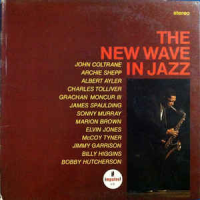 Various
Various The New Wave In Jazz
1966
Not a compilation of previously recorded or upcoming tracks, the gotta-have-it The New Wave In Jazz documents a March 1965 gig at NYC's The Village Gate organised by writer and polemicist Leroi Jones (as Amiri Baraka was then known). The lineup is New Thing royalty. There are five bands, each of which plays one track: John Coltrane's classic quartet opens with "Nature Boy," followed by groups led by Albert Ayler ("Holy Ghost"), Grachan Moncur ("Blue Free"), Archie Shepp ("Hambone") and Charles Tolliver ("Brilliant Corners"). Sidemen include McCoy Tyner, Jimmy Garrison, Elvin Jones, Sonny Von Murray, Cecil McBee, Bobby Hutcherson, Marion Brown, James Spaulding and Billy Higgins. The gang is pretty much all here and it sounds like it was a magic evening.
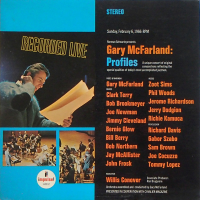 Gary McFarland
Gary McFarland Profiles
1966
Had composer, arranger and vibraphonist Gary McFarland not passed so tragically young, (aged 38, in 1971), he might have become a luminary of orchestral jazz. He was one of a group of arrangers at Impulse!—Oliver Nelson, Lalo Schifrin and Chico O'Farrill were the others—whose albums struck a chord with jazz aficionados and whose soundtracks were hits with mainstream film and TV audiences. McFarland's catalogue contains a few forgettable, commercially orientated albums, but others of substance. Chief among the latter are the Creed Taylor-produced Big Band Bossa Nova (Verve, 1962) with Stan Getz, and Profiles. On Profiles, recorded live with a twenty-piece band at the Lincoln Center, McFarland presents six sparkling originals, which are enhanced by A-list soloists including valve trombonist Bob Brookmeyer, trumpeter Clark Terry, alto saxophonist Phil Woods, tenor saxophonist Zoot Sims and guitarist Gabor Szabo.
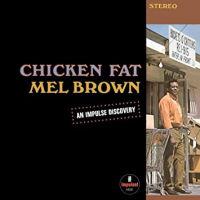 Mel Brown
Mel Brown Chicken Fat
1967
Imagine Grant Green and Booker T & The MGs getting together for a late-night jam and you are in the right ballpark for Chicken Fat. This is the first, and best, of six albums the Los Angeles-based guitarist Mel Brown made for Impulse!. "Chicken Fat" and "Greasy Spoon" open things up. "Anacrusis" and "Hobo Flats" have arrangements by Oliver Nelson, and the entire nine-track affair cooks from start to finish. Herb Ellis and Arthur Wright alternate as second guitarists, Gerald Wiggins is on organ, Ronald Brown on electric bass and Paul Humphrey on drums. 1970's I'd Rather Suck My Thumb has its moments, most notably the eleven-minute guitar solo "Eighteen Pounds Of Unclean Chitlins," but Chicken Fat is the boss.
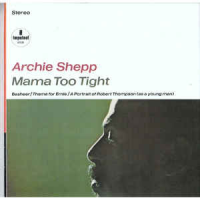 Archie Shepp
Archie Shepp Mama Too Tight
1967
The New Thing celebrated the connection between free jazz and its funky, downhome roots and this was captured to perfection on the title track of Archie Shepp's Mama Too Tight. Leading a seven-piece horn section which included two trombonists (Grachan Moncur and Roswell Rudd) and a tuba player (Howard Johnson), Shepp evokes what he calls in the liner notes the "jubilant irreverence" of a New Orleans marching band returning from a funeral, the outward journey's solemnity replaced by exuberance. As was his wont even this early in his career, Shepp rings the emotional and sonic changes with a ballad, on this occasion Duke Ellington's lovely "Prelude To A Kiss."
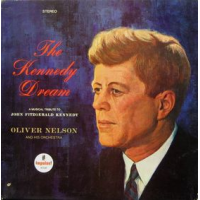 Oliver Nelson
Oliver Nelson The Kennedy Dream
1967
Oliver Nelson's The Kennedy Dream was released four years after President Kennedy's death. No need to wait for the passing of the 2020 presidential incumbent for someone to record The Trump Nightmare. The Kennedy Dream is not Nelson's finest work, and Kennedy was not perfect either, but the album reminds us of the affection which the best American presidents have inspired among all races. Nelson leads a twelve-piece band, augmented by a string section, through seven originals, plus George Weiss' "John Kennedy Memorial Waltz." The tracks are interspersed with excerpts from recordings of speeches (always a tricky inclusion) of Kennedy speeches. Soloists include Nelson on tenor and alto saxophones, Phil Woods on alto saxophone, Snooky Young on trumpet and Jerome Richardson on flute.
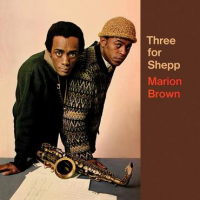 Marion Brown
Marion Brown Three For Shepp
1967
Alto saxophonist Marion Brown's recorded debut was on Archie Shepp's Fire Music (Impulse!, 1965) and
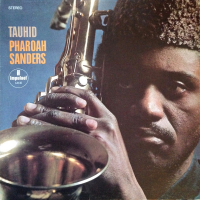 Pharoah Sanders
Pharoah Sanders Tauhid
1967
Because it included the breakout track "The Creator Has A Master Plan," Pharoah Sanders' 1969 album Karma is by several parsecs the best known of the dozen or so he made for Impulse!. It was not, however, Sanders' favourite. "It sold, people liked it," said Sanders later. "But I just couldn't be proud about the engineering part of it. It had me and the bassist on the same channel, so they couldn't turn me up [separately]. That was very horrible to me personally at the time." No such technical issues spoil Sanders' five-star label debut, Tauhid. It is, bizarrely, among Sanders' least known Impulse! discs, possibly because there are no real vocals. Sanders, mainly on tenor, is accompanied by guitarist Sonny Sharrock, pianist Dave Burrell, bassist Henry Grimes, drummer Roger Blank and percussionist Nat Bettis. "Upper Egypt & Lower Egypt," which takes up all of side one on the vinyl version, is perhaps the brightest jewel in Sanders' entire astral-jazz canon.
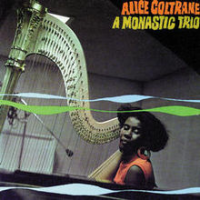 Alice Coltrane
Alice Coltrane A Monastic Trio
1968
Pianist and harpist Alice Coltrane's own-name Impulse! debut tends to get overshadowed by 1970's Ptah, The El Daoud and 1971's Journey In Satchidananda, possibly because of the presence of saxophonists / flautists Pharoah Sanders and Joe Henderson on the first, and Sanders on the second. But A Monastic Trio, made with bassist Jimmy Garrison and alternating drummers Ben Riley and Rashied Ali (with a brief appearance from Sanders on bass clarinet on one track), is every bit as good. Indeed, the leaner lineup gives a greater share of the spotlight to Coltrane. Stand-out tracks are the harp feature "Lovely Sky Boat" and the more acerbic piano feature "Gospel Trane." Still with Impulse!, Coltrane's 2004 swansong, Translinear Light, is another album deserving of wider recognition.
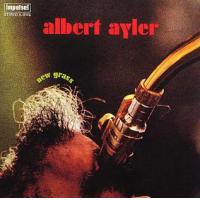 Albert Ayler
Albert Ayler New Grass
1969
First, in the early 1960s, Albert Ayler divided critics and audiences with a scorched-earth tenor saxophone style which made John Coltrane at his most ferocious sound almost moderate. Then, at the end of the decade, he divided them again with New Grass. The album was Ayler's attempt to connect with a wider audience and this time out his low-end honks and altissimo screams are presented in an R&B context. Ayler was accused by some observers of selling out, much as Miles Davis was around the same time. But while Davis' Bitches Brew (Columbia, 1970) was eventually recognised as a masterpiece, New Grass, which is, admittedly, not in the same league, has always existed on the margins (and did not make it to CD in the US until 2005).
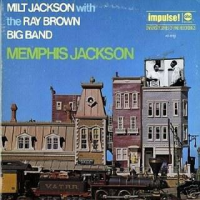 Milt Jackson With The Ray Brown Big Band
Milt Jackson With The Ray Brown Big Band Memphis Jackson
1970
Though typically associated with small groups, vibraphonist Milt Jackson made some memorable albums with big bands, including two with Count Basie, another with a lineup arranged by Melba Liston, and this one. Memphis Jackson is a smoking collection of burners, blues and gospel— Victor Feldman's "Queen Mother Stomp," Rudy Toombs' "One Mint Julep," Ray Brown's "Braddock Breakdown," Edward Hawkins' "Oh Happy Day" and Jackson's title track among them. The crème de la crème, however, is perhaps a gorgeous five-minute reading of Jackson's ballad "Enchanted Lady." The band includes alto saxophonist Ernie Watts, tenor saxophonists Harold Land and Teddy Edwards, trumpeter Harry "Sweets" Edison and trombonist Jimmy Cleveland. Buried treasure waiting to be rediscovered.
 Shabaka & The Ancestors
Shabaka & The Ancestors We Are Sent Here By History
2020
Nothing signals Impulse!'s return to the cutting edge so much as its 2018 signing of reed player Shabaka Hutchings, among the most exciting of the musicians in the vanguard of London's post-2015 underground jazz movement. By spring 2020, the label had released four albums, all of them essential listening, by three of Hutchings' bands. First up was Sons of Kemet with Your Queen Is A Reptile (2018). Next was The Comet Is Coming with Trust In The Lifeforce Of The Deep Mystery and Afterlife (both 2019). Then came Shabaka & the Ancestors . We Are Sent Here By History, the second album Hutchings has made with the South African band, is a breathtaking reimagining not only of South African jazz but, like everything Hutchins does, a new spin on the jazz tradition in general.
Photo: The Comet is Coming by Fabrice Bourgelle. L-R: Dan "Danalogue" Leavers, "King Shabaka" Hutchings, Max "Betamax" Hallett.
Tags
PREVIOUS / NEXT
Shabaka Hutchings Concerts
Support All About Jazz
 All About Jazz has been a pillar of jazz since 1995, championing it as an art form and, more importantly, supporting the musicians who make it. Our enduring commitment has made "AAJ" one of the most culturally important websites of its kind, read by hundreds of thousands of fans, musicians and industry figures every month.
All About Jazz has been a pillar of jazz since 1995, championing it as an art form and, more importantly, supporting the musicians who make it. Our enduring commitment has made "AAJ" one of the most culturally important websites of its kind, read by hundreds of thousands of fans, musicians and industry figures every month.












